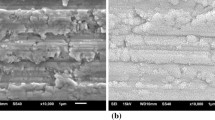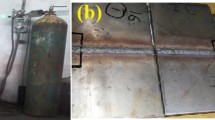Abstract
In this paper, we present the application of the fuzzy logic analysis to a Taguchi orthogonal experiment for developing a robust model with high efficiency in multiple performance characteristics (MPCs) of the plasma transfer arc welding (PTAW) hardfacing process. It eliminates uncertain information and is a simple, effective, and efficient approach. A fuzzy logic system is used to simultaneously investigate relationships between various MPCs and to determine the efficiency of each trial of the Taguchi experiments. From the fuzzy inference process, we are able to determine the optimal setting of factor-levels for the MPCs. In addition, we also use the analysis of variance (ANOVA) to identify the significant factors, which coincide with findings from the fuzzy logic analysis and are found to account for about 79% of the total variance. Furthermore, a confirmation experiment of the optimal process is conducted, and it verifies that both individual performance characteristics and MPCs are successfully optimized and satisfy our desired levels of MPCs.
Similar content being viewed by others
References
Kuldarni KM, Anand V (1981) Metal powders used for hardfacing. Metal handbook, 9th edn. American Society for Metals, Metals Park, OH. USA
Jeffus L (1999) Welding: principles and applications, 4th edn. International Thomson, Three Park Avenue, New York
Vijaya M, Krishna R, Prabhakar O, Shankar NG (1996) Simultaneous optimization of flame spraying process parameters for high quality molybdenum coatings using taguchi methods. Surface Coatings Technol 79:276–288
Yang LJ (2001) Plasma surface hardening of ASSAB 760 steel specimens with Taguchi optimisation of the processing parameters. J Mater Process Technol 113:521–526
Alsaran A, Celik A, and Celik C (2002) Determination of the optimum conditions for ion nitriding of AISI 5140 steel. Surface Coatings Technol 160:219–226
Elsayed EA, Chen A (1993) Optimal levels of process parameters for products with multiple characteristics. Int J Prod Res 31:1117–1132
Tong LI, Su CT, Wang CH (1997) The optimisation of multi-response problems in Taguchi method. Int J Qual Reliab Manage 14:367–380
Chen SL, Shen D (1999) Optimisation and quantitative evaluation of the qualities for Nd-YAG laser transformation hardening. Int J Adv Manuf Technol 15:70–78
Kenneth G (1988) Surface engineering for wear resistance. Prentice-Hall, Englewood Cliffs, NJ
Haris P, Smith BL (1983) Factorial techniques for weld quality prediction. Metal Construct 15:661–666
Ross TJ (1995) Fuzzy logic with engineering applications. McGraw-Hill, New York
Cherkassky V, Mulier F (1998) Learning from data: concepts, theory, and methods. Wiley, USA
Yuin W, Alan W (2000) Taguchi methods for robust design. ASME, USA
Author information
Authors and Affiliations
Corresponding author
Rights and permissions
About this article
Cite this article
Wang, JT., Jean, MD. Optimisation of cobalt-based hardfacing in carbon steel using the fuzzy analysis for the robust design. Int J Adv Manuf Technol 28, 909–918 (2006). https://doi.org/10.1007/s00170-004-2123-6
Received:
Accepted:
Issue Date:
DOI: https://doi.org/10.1007/s00170-004-2123-6




